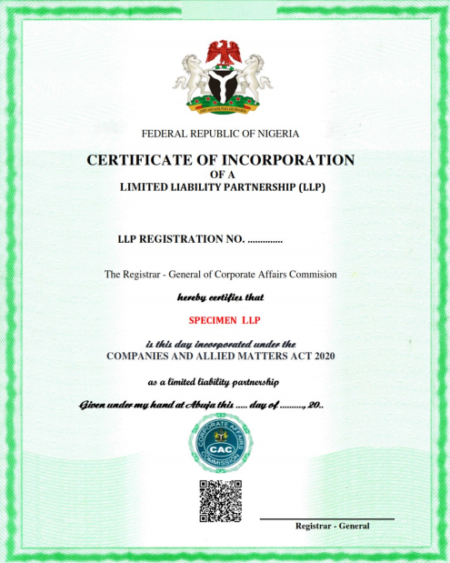A Limited Liability Partnership (LLP) is a unique business structure that combines the advantages of both partnerships and limited liability companies (LLCs). It is a relatively modern business form that offers the flexibility of a traditional partnership with the added benefit of limited liability protection for its partners.
Exploring the Key Features of a Limited Liability Partnership (LLP)
In Nigeria, LLPs have become a popular choice for professionals, small businesses, and startups seeking the ideal balance of flexibility, tax efficiency, and personal asset protection.
This blog post will provide a comprehensive look at the key features of an LLP, its benefits, and how it differs from other business structures.
Understanding Limited Liability Partnership (LLP)
A Limited Liability Partnership (LLP) is a body corporate with a legal personality separate from its members. It is a hybrid business form that infuses two types of business; a Partnership and a Limited Liability Company.
LLPs in Nigeria must have at least two partners, and there is no limit to the maximum number of partners. The partners can be individuals or corporations, and each partner is only liable for the debts and obligations of the partnership to the extent of their capital contribution.
This option is suited to a group of professionals (accountants, lawyers, doctors, architects, etc) with lots of experience and clients between them, as it allows them to pool resources together, thereby lowering the cost of doing business while increasing the LLP’s capacity for growth.
We offer a range of services to make it easy for you to get started, from facilitating registration with the Corporate Affairs Commission (CAC) to obtaining your Tax Identification Number (TIN). Our comprehensive business support will ensure you have everything you need to succeed.
Key Features of a Limited Liability Partnership (LLP)
How does a Limited Liability Partnership (LLP) Work?
1. Limited Liability Protection:
One of the most significant features of an LLP is the limited liability protection it offers to its partners. This means:
- Partners are not personally liable for the debts and obligations of the LLP.
- A partner's assets are protected from claims arising from the negligence or misconduct of other partners.
- The liability of each partner is generally limited to their investment in the business.
However, it's important to note that partners may still be held liable for their negligence or malpractice.
2. Flexible Management Structure:
Unlike corporations with rigid hierarchies, LLPs offer a more flexible management structure:
- Partners have the freedom to actively participate in the management of the business.
- Decision-making can be collaborative, with each partner having a say in the business operations.
- The partnership agreement can define roles, responsibilities, and decision-making processes according to the partners' preferences.
This flexibility allows for a more dynamic and responsive business operation, tailored to the specific needs of the partners and the industry.
3. Pass-Through Taxation:
LLPs benefit from pass-through taxation, similar to general partnerships:
- The LLP itself is not taxed as a separate entity.
- Profits and losses "pass-through" to the individual partners.
- Partners report their share of the LLP's income or losses on their tax returns.
- This approach avoids the double taxation often associated with corporations.
The tax treatment can result in significant savings and simplify the overall tax process for the business.
4. Perpetual Existence:
An LLP has the feature of perpetual existence, which means:
- The LLP can continue to operate regardless of changes in partnership.
- If a partner leaves, dies, or becomes incapacitated, the LLP can continue its business operations.
- This continuity provides stability and makes LLPs attractive for long-term business planning.
5. Separate Legal Entity:
An LLP is recognized as a separate legal entity from its partners:
- It can own property, enter into contracts, and sue or be sued in its name.
- The LLP can continue to exist even if the original partners leave or new partners join.
- This separation provides additional protection and clarity in legal and business matters.
6. Professional Autonomy:
LLPs are particularly popular among professional service firms because they offer:
- The ability for professionals to retain their autonomy while working in a collaborative environment.
- Protection from liability for the actions of other partners is crucial in high-risk professions.
- The opportunity to pool resources and expertise without sacrificing individual professional identity.
7. Transparency and Accountability:
LLPs are required to maintain a high level of transparency:
- They must file annual returns and financial statements with the appropriate regulatory bodies.
- This requirement ensures accountability and provides valuable information to stakeholders.
- The level of disclosure can vary depending on the jurisdiction and the size of the LLP.
8. Ease of Formation and Maintenance:
Compared to corporations, LLPs are generally easier to form and maintain:
- The formation process is often simpler and less expensive than incorporating.
- There are typically fewer ongoing compliance requirements.
- Changes to the partnership structure can usually be made more easily than in a corporation.
9. Flexibility in Profit Sharing:
LLPs offer significant flexibility in how profits (and losses) are distributed among partners:
- The partnership agreement can specify various profit-sharing arrangements.
- Distributions can be based on factors such as capital contribution, work performed, or any other agreed-upon criteria.
- This flexibility allows for fair compensation aligned with each partner's contribution to the business.
10. Access to Capital:
While not as extensive as corporations, LLPs do have some advantages in raising capital:
- New partners can be admitted, bringing in fresh capital and expertise.
- The limited liability feature can make the LLP structure attractive to potential investors.
- Some jurisdictions allow LLPs to have corporate partners, potentially opening up additional funding avenues.
11. International Recognition:
Many countries recognize the LLP structure, which can be beneficial for businesses operating internationally:
- It can simplify cross-border transactions and partnerships.
- The familiar structure can make it easier to establish business relationships in different countries.
- However, it's crucial to understand that LLP regulations can vary significantly between jurisdictions.
12. Scalability:
LLPs offer a structure that can grow with the business:
- New partners can be added as the business expands.
- The flexible management structure allows for adaptation as the organization grows.
- The LLP can evolve into other business structures if needed, though this process can be complex and should be carefully considered.
Differences Between LLPs and Other Business Entities
- LLP vs General Partnership: In a general partnership, partners have unlimited liability, meaning they are personally liable for the debts and obligations of the business.
In contrast, an LLP provides limited liability protection, ensuring that the personal assets of the partners are shielded from the business’s liabilities. - LLP vs Limited Liability Company (LLC): While both LLPs and LLCs offer limited liability protection, LLPs provide more flexibility in management and governance.
LLCs, on the other hand, have a more rigid structure with a board of directors and formal governance rules. Additionally, LLPs often enjoy tax transparency, whereas LLCs may face double taxation in some jurisdictions. - LLP vs Sole Proprietorship: A sole proprietorship is owned and run by a single individual who has unlimited personal liability for the business.
In contrast, LLPs involve multiple partners with limited liability protection, making it a safer option for those seeking to protect their assets.
Why Choose an LLP?
LLPs are ideal for professional services firms, small businesses, and startups that require a flexible business structure with limited liability protection. This structure is particularly attractive for accountants, lawyers, consultants, and other professionals who wish to collaborate in a shared business venture without risking personal assets.
Some of the main reasons businesses opt for LLPs include:
- Liability Protection: Shield personal assets from business liabilities.
- Management Flexibility: Partners have the freedom to manage the business as they see fit.
- Tax Efficiency: Pass-through taxation can reduce the tax burden on the business.
- No Minimum Capital: Easier to start compared to entities that require significant capital investment.
- Perpetual Succession: Ensures continuity of the business even if partners change.
Documents Issued upon LLP Registration
After successfully registering an LLP, the following documents will be issued:
- Certificate of Incorporation: This serves as conclusive evidence of the LLP's formation.
- Status Report: A report detailing the LLP's registration status.
- Partnership Agreement: A copy of the partnership agreement filed during the registration process.

Conclusion
The features of a Limited Liability Partnership (LLP) make it an attractive option for entrepreneurs and professionals seeking a flexible and secure business structure. With benefits such as limited liability protection, pass-through taxation, and enhanced credibility, an LLP provides a robust framework for conducting business while safeguarding personal assets.
Are you ready to register your LLP in Nigeria? Contact our team for expert guidance and support throughout the registration process.
Register your Limited Liability Partnership (LLP) Business in Nigeria
Here's how SplashDict's team of CAC-accredited consultants can help:



